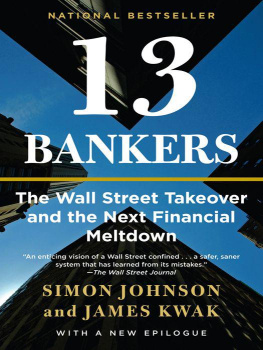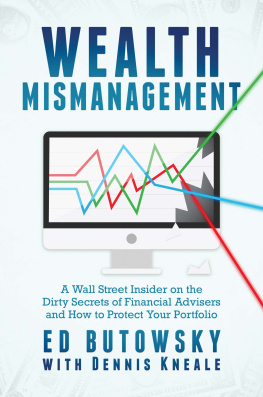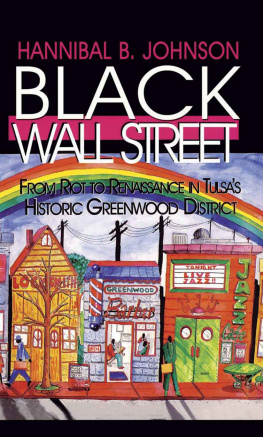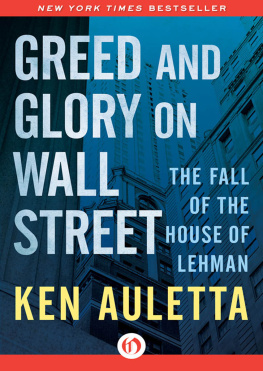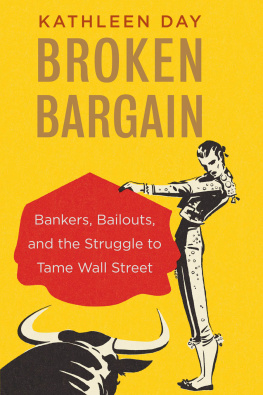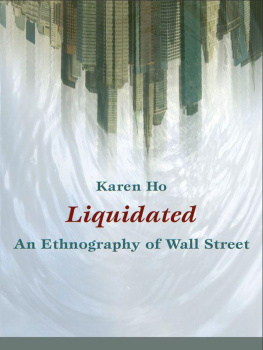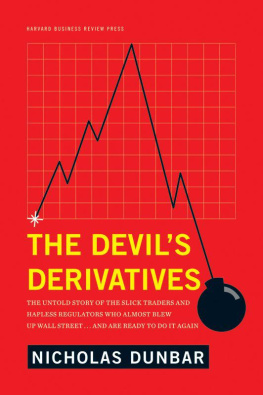Simon Johnson - 13 Bankers: The Wall Street Takeover and the Next Financial Meltdown (Vintage)
Here you can read online Simon Johnson - 13 Bankers: The Wall Street Takeover and the Next Financial Meltdown (Vintage) full text of the book (entire story) in english for free. Download pdf and epub, get meaning, cover and reviews about this ebook. year: 2010, publisher: Vintage, genre: Politics. Description of the work, (preface) as well as reviews are available. Best literature library LitArk.com created for fans of good reading and offers a wide selection of genres:
Romance novel
Science fiction
Adventure
Detective
Science
History
Home and family
Prose
Art
Politics
Computer
Non-fiction
Religion
Business
Children
Humor
Choose a favorite category and find really read worthwhile books. Enjoy immersion in the world of imagination, feel the emotions of the characters or learn something new for yourself, make an fascinating discovery.
- Book:13 Bankers: The Wall Street Takeover and the Next Financial Meltdown (Vintage)
- Author:
- Publisher:Vintage
- Genre:
- Year:2010
- Rating:3 / 5
- Favourites:Add to favourites
- Your mark:
- 60
- 1
- 2
- 3
- 4
- 5
13 Bankers: The Wall Street Takeover and the Next Financial Meltdown (Vintage): summary, description and annotation
We offer to read an annotation, description, summary or preface (depends on what the author of the book "13 Bankers: The Wall Street Takeover and the Next Financial Meltdown (Vintage)" wrote himself). If you haven't found the necessary information about the book — write in the comments, we will try to find it.
Simon Johnson: author's other books
Who wrote 13 Bankers: The Wall Street Takeover and the Next Financial Meltdown (Vintage)? Find out the surname, the name of the author of the book and a list of all author's works by series.
13 Bankers: The Wall Street Takeover and the Next Financial Meltdown (Vintage) — read online for free the complete book (whole text) full work
Below is the text of the book, divided by pages. System saving the place of the last page read, allows you to conveniently read the book "13 Bankers: The Wall Street Takeover and the Next Financial Meltdown (Vintage)" online for free, without having to search again every time where you left off. Put a bookmark, and you can go to the page where you finished reading at any time.
Font size:
Interval:
Bookmark:
The best explanation yet for how the smart guys on Wall Street led us to the brink of collapse. In the process, Johnson and Kwak demystify our financial system, stripping it down to expose the ruthless power grab that lies at its center.
Elizabeth Warren, Professor of Law, Harvard Law School; Chair, TARP Congressional Oversight Panel
Too many discussions of the Great Recession present it as a purely economic phenomenon. Simon Johnson was the first to point out that this was and is a crisis of political economy. His and James Kwaks analysis of the unholy intertwining of Washington and Wall Streeta cross between the gilded age and a banana republicis essential reading.
Niall Ferguson, Professor of History, Harvard University; Professor, Harvard Business School; and author of The Ascent of Money
A disturbing and painstakingly researched account of how the banks wrenched control of government and society out of our handsand what we can do to seize it back.
Bill Moyers
Essential reading for anyone who wants to understand what comes next for the world economy. Dangerous and reckless elements of our financial sector have become too powerful and must be reined in. If this problem is not addressed, there is serious trouble in all our futures.
Nouriel Roubini, Professor of Economics, Leonard N. Stern School of Business, New York University; Chairman of Roubini Global Economics
Beautifully written and powerful. Ties the current financial crisis to a cycle of politics as old as the Republic, and to a pathology in our politics that is as profound as any that our Republic has faced. Required reading for the president, and anyone else who cares for this Republic.
Lawrence Lessig, Director of the Edmond J. Safra Foundation Center for Ethics, Harvard University
Johnson and Kwak not only tell us in great detail how the crisis happened and what we must do to avoid another crisis, but they see the deeper political and cultural context that permitted carelessness and excess nearly to break the financial system and plunge us into a depression.
Bill Bradley, former U.S. Senator
A chilling tale of the dangers of concentrated economic, intellectual, and political power. Even if you do not agree with everything the authors have to say, this book makes it clear why ending too big to fail and reforming the institutions that perpetuate it are essential for our nations future economic prosperity and, more fundamentally, our democratic system.
U.S. Senator Jim Bunning
This book is remarkable in its scope and conclusions. It places changes in financial services and the sectors regulation over the last twenty years in the context of the last two hundred, and the comparison isnt favorable. Its the one book the president (and the Congress) should read.
George David, former Chairman, United Technologies Corporation
A timely, informative, and important book. You may not agree with all the analysis, but the issues so clearly discussed are real, current, and vitally important. Financial industry reform must be undertaken soon; inaction, as the authors convincingly argue, would have dangerous consequences. This book explains it all, and its great reading.
Lawrence K. Fish, former Chairman and Chief Executive Officer, Citizens Financial Group

SIMON JOHNSON AND JAMES KWAK
13 BANKERS
Simon Johnson is Ronald A. Kurtz Professor of Entrepreneurship at MITs Sloan School of Management and a senior fellow of the Peterson Institute for International Economics. He is coauthor, with James Kwak, of The Baseline Scenario, a leading economic blog, described by Paul Krugman as a must-read and by Bill Moyers as one of the most informative news sites in the blogosphere.
James Kwak has had a successful business career as a consultant for McKinsey & Company and as a software entrepreneur. He is currently a student at Yale Law School.
baselinescenario.com
ALSO BY SIMON JOHNSON
Starting Over in Eastern Europe:
Entrepreneurship and Economic Renewal
(with Gary Loveman)

FIRST VINTAGE BOOKS EDITION, JANUARY 2011
Copyright 2010, 2011 by Simon Johnson and James Kwak
All rights reserved. Published in the United States by Vintage Books, a division of Random House, Inc., New York, and in Canada by Random House of Canada Limited, Toronto. Originally published in hardcover in slightly different form in the United States by Pantheon Books, a division of Random House, Inc., New York, in 2010.
Vintage and colophon are registered trademarks of Random House, Inc.
The Library of Congress has cataloged the Pantheon edition as follows:
Johnson, Simon.
13 bankers : the Wall Street takeover and the next financial meltdown / Simon Johnson and James Kwak.
p. cm.
1. Banks and bankingUnited States. 2. Bank failuresUnited States. 3. FinanceUnited States. 4. Financial crisesUnited States. I. Kwak, James. II. Title. III. Title: Thirteen bankers.
HG2491.J646 2010 332.10973dc22
2010000168
eISBN: 978-0-307-37922-1
Author photographs Anthony Armand Placet (Johnson) and
courtesy of the author (Kwak)
Cover photograph Alex Ely/Getty Images
www.vintagebooks.com
v3.1
TO OUR FAMILIES
They were careless people, Tom and Daisythey smashed up things and creatures and then retreated back into their money or their vast carelessness, or whatever it was that kept them together, and let other people clean up the mess they had made.
F. Scott Fitzgerald, The Great Gatsby
13 Bankers
My administration is the only thing between you and the pitchforks.
Barack Obama, March 27, 2009
Friday, March 27, 2009, was a lovely day in Washington, D.C.but not for the global economy. The U.S. stock market had fallen 40 percent in just seven months, while the U.S. economy had lost 4.1 million jobs.
Despite three government bailouts, Citigroup stock was trading below $3 per share, about 95 percent down from its peak; stock in Bank of America, which had received two bailouts, had lost 85 percent of its value. The public was furious at the recent news that American International Group, which had been rescued by commitments of up to $180 billion in taxpayer money, was paying $165 million in bonuses to executives and traders at the division that had nearly caused the company to collapse the previous September. The Obama administrations proposals to stop the bleeding, initially panned in February, were still receiving a lukewarm response in the press and the markets. Prominent economists were calling for certain major banks to be taken over by the government and restructured. Wall Streets way of life was under threat.
That Friday in March, thirteen bankersthe CEOs of thirteen of the countrys largest financial institutionsgathered at the White
What did that mean, were all in this together? It was clear that the thirteen bankers needed the government. Only massive government intervention, in the form of direct investments of taxpayer money, government guarantees for multiple markets, practically unlimited emergency lending by the Federal Reserve, and historically low interest rates, had prevented their banks from following Bear Stearns, Lehman Brothers, Merrill Lynch, Washington Mutual, and Wachovia into bankruptcy or acquisition in extremis. But why did the government need the bankers?
Font size:
Interval:
Bookmark:
Similar books «13 Bankers: The Wall Street Takeover and the Next Financial Meltdown (Vintage)»
Look at similar books to 13 Bankers: The Wall Street Takeover and the Next Financial Meltdown (Vintage). We have selected literature similar in name and meaning in the hope of providing readers with more options to find new, interesting, not yet read works.
Discussion, reviews of the book 13 Bankers: The Wall Street Takeover and the Next Financial Meltdown (Vintage) and just readers' own opinions. Leave your comments, write what you think about the work, its meaning or the main characters. Specify what exactly you liked and what you didn't like, and why you think so.

